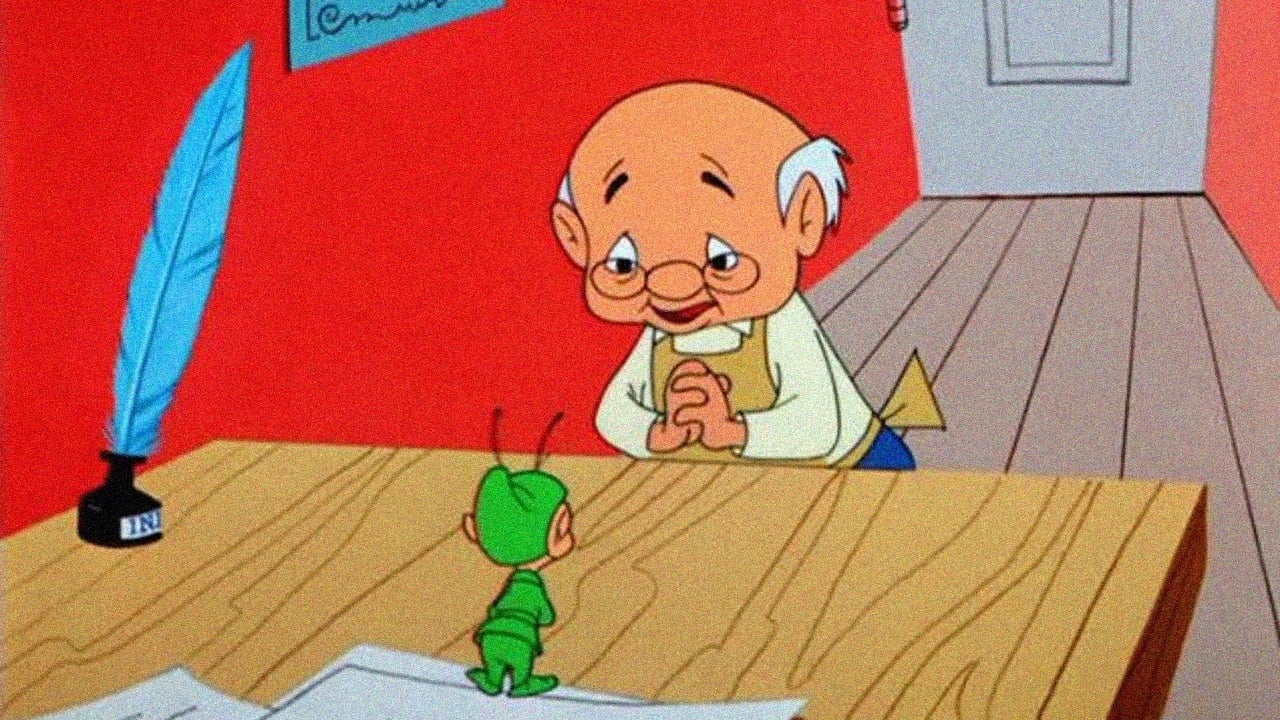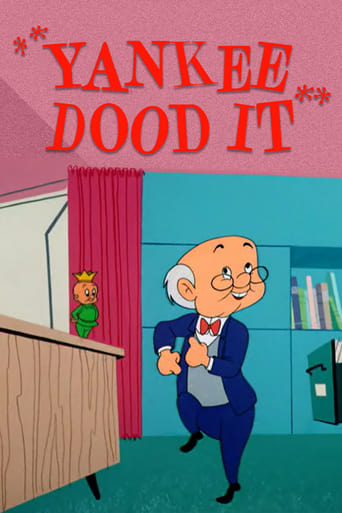Matialth
Good concept, poorly executed.
Calum Hutton
It's a good bad... and worth a popcorn matinée. While it's easy to lament what could have been...
Sarita Rafferty
There are moments that feel comical, some horrific, and some downright inspiring but the tonal shifts hardly matter as the end results come to a film that's perfect for this time.
Billy Ollie
Through painfully honest and emotional moments, the movie becomes irresistibly relatable
utgard14
A completely bizarre short apparently meant to tap into the struggling small businessman market that was watching cartoons at the time and convince them mass production was the solution to all their financial difficulties. It's basically a warped take on the Shoemaker & the Elves story, with Elmer as the king of the elves who sends one of his underlings to find out why the shoemaker is still using elf labor in the 20th Century. He needs to be using human slave labor, not elves! There's also an equally strange subplot about the shoemaker's cat, Sylvester, tricking the elves into saying "Jehoshaphat" because that turns them into mice. The animation is nice and colorful. The music is cheery and upbeat. Good voice work from Mel Blanc, Arthur Q. Bryan, and Daws Butler. It's never funny (intentionally, at least) but there's something weirdly fascinating about it. An interesting curio for sure.
TheLittleSongbird
The other two being By Word of Mouse and Heir-Conditioned, with the former being the best of the three, because it did have some entertaining moments and had something to say. Heir-Conditioned was watchable enough, but while it does make some decent points about economics and investments it did feel heavy-handed, mostly failed to entertain and wasted most of its characters. Yankee Dood It for me is the weakest of the three, mainly because it does feel pointless and fares the worst of the three in entertaining and educating the viewer.Yankee Dood It does have its good points, sure, with all the strengths being exactly the same as the strengths for Heir Conditioned. The animation, in distinctive Fritz Freleng style, is very bright and colourful with some nice background detail and nicely drawn characters. Even better is the vibrant and character music score from Milt Franklyn, it fits wonderfully and does add a lot to the action, it's rousing in energy, orchestration is rich and beautiful and rhythmically it's very lively yet dynamic. Mel Blanc, Arthur Q. Bryan and Daws Butler do reliably strong jobs with the voices, all three have had stronger material but they were still able to deliver some good energy, then again they were nearly always able to bring class and some sort of energy to even the weakest material. Despite having little to do, Sylvester is very nice to see, has some wildly amusing if very predictable moments and his personality is truer to the personality we associate him with than in Heir Conditioned, even with not much to do he didn't feel downplayed but he has been far more interesting a character.However, Yankee Dood It's main problem is that it's not very funny, nor is it very informative. Whereas By Word of Mouse did entertain in its second half and Heir Conditioned had a few decent laughs with the alley cats, Yankee Doodle It's humour is spare, not sharp enough and is not unlike anything else we've seen with Sylvester, it is at best only mildly amusing. Unfortunately, Yankee Dood It also doesn't do a particularly great job on the educating and informing side, despite being the short to have the (slightly) most accessible subject matter of the three it is written in a way that is likely to confuse younger audiences and adults are likely to find it over-simplified and one-dimensionally explored. Some may criticise By Word of Mouse for 'glorifying the wonders of capitalism', but Yankee Dood It does this much more glaringly, with the low prices, higher wages it only shows the good sides of capitalism and not much else. The points the cartoon tries to make is delivered with heavy-handedly as well, so at the end of the day the cartoon, having failed at both its main objectives, just feels pointless.The story is slow-going and what there is of it feels rather sugary sweet, complete with a very forced ending. Despite the good voice acting, the characters' material is not strong enough to carry the cartoon properly. Like in Heir Conditioned, it is nice to see Elmer less of an idiot than usual but with his personality as underplayed as it is what makes Elmer as memorable a character as he is doesn't come through here. The Elf and the Shoemaker are bland characters too, and the Elf's rapport with Sylvester fails to amuse or rouse because the material is so tired and predictable.Overall, not unwatchable but doesn't have an awful lot of point to it. 4/10 Bethany Cox
MartyD82-1
The king (voiced by Arthur Q. Bryan) of a team of elves is worried about all the elves missing from his pack and sends one of his remaining elves to retrieve them. The elves are, of course, employed by "the shoemaker." He must somehow retrieve them, and get by the shoemaker's pet Sylvester at the same time. Meanwhile, the elven king drops by and literally gives the shoemaker a lesson in modern business management.In the mid-1950s, Friz Freling was experimenting with pseudo-educational cartoon shorts in much the same vein as the shorts Disney was putting out at around the same time. Yankee Dood-It was probably the best of the bunch, but that's actually saying very little. Sylvester is the obvious comic relief of the cartoon, and aside from his constant attempts at taking advantage of the "Jehosefat" spell (saying "Jehosefat" apparently turns elves into mice), there are absolutely no jokes to speak of. A good third of the cartoon involves the king playing an educational slide show for the shoemaker to teach him how to run his business in the then 20th century. The cartoon's finale is so forced and predictable, it isn't even worth mentioning in "non-spoiler text."Overall, this is a fairly pointless short that seems to be more about Freling trying to do something Disney did a lot better at the same time than doing what he himself does best - which is to make funny, non-PC, non-moralistic cartoons.
archiveguy
Less a comedy cartoon short and more a hymn of praise to the merits of our capitalist society, there is exactly one laugh in the whole film. The rest is merely an extended textbook-style illustration of how "industwy" and "pwofit" motives work (in a style more typical of Disney, which did several of these types of shorts)--all of which sounds a little weird as explained in Elmer's voice. Sylvester's barely used at all.

